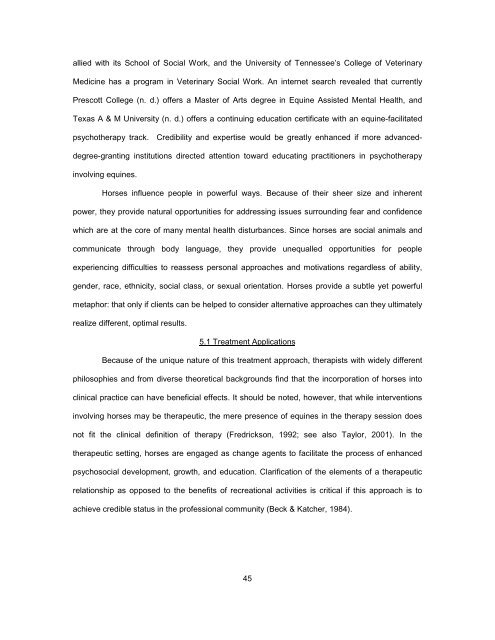A SYSTEMATIC REVIEW OF THE EFFECTS OF PSYCHOTHERAPY ...
A SYSTEMATIC REVIEW OF THE EFFECTS OF PSYCHOTHERAPY ...
A SYSTEMATIC REVIEW OF THE EFFECTS OF PSYCHOTHERAPY ...
Create successful ePaper yourself
Turn your PDF publications into a flip-book with our unique Google optimized e-Paper software.
allied with its School of Social Work, and the University of Tennessee’s College of Veterinary<br />
Medicine has a program in Veterinary Social Work. An internet search revealed that currently<br />
Prescott College (n. d.) offers a Master of Arts degree in Equine Assisted Mental Health, and<br />
Texas A & M University (n. d.) offers a continuing education certificate with an equine-facilitated<br />
psychotherapy track. Credibility and expertise would be greatly enhanced if more advanceddegree-granting<br />
institutions directed attention toward educating practitioners in psychotherapy<br />
involving equines.<br />
Horses influence people in powerful ways. Because of their sheer size and inherent<br />
power, they provide natural opportunities for addressing issues surrounding fear and confidence<br />
which are at the core of many mental health disturbances. Since horses are social animals and<br />
communicate through body language, they provide unequalled opportunities for people<br />
experiencing difficulties to reassess personal approaches and motivations regardless of ability,<br />
gender, race, ethnicity, social class, or sexual orientation. Horses provide a subtle yet powerful<br />
metaphor: that only if clients can be helped to consider alternative approaches can they ultimately<br />
realize different, optimal results.<br />
5.1 Treatment Applications<br />
Because of the unique nature of this treatment approach, therapists with widely different<br />
philosophies and from diverse theoretical backgrounds find that the incorporation of horses into<br />
clinical practice can have beneficial effects. It should be noted, however, that while interventions<br />
involving horses may be therapeutic, the mere presence of equines in the therapy session does<br />
not fit the clinical definition of therapy (Fredrickson, 1992; see also Taylor, 2001). In the<br />
therapeutic setting, horses are engaged as change agents to facilitate the process of enhanced<br />
psychosocial development, growth, and education. Clarification of the elements of a therapeutic<br />
relationship as opposed to the benefits of recreational activities is critical if this approach is to<br />
achieve credible status in the professional community (Beck & Katcher, 1984).<br />
45
















